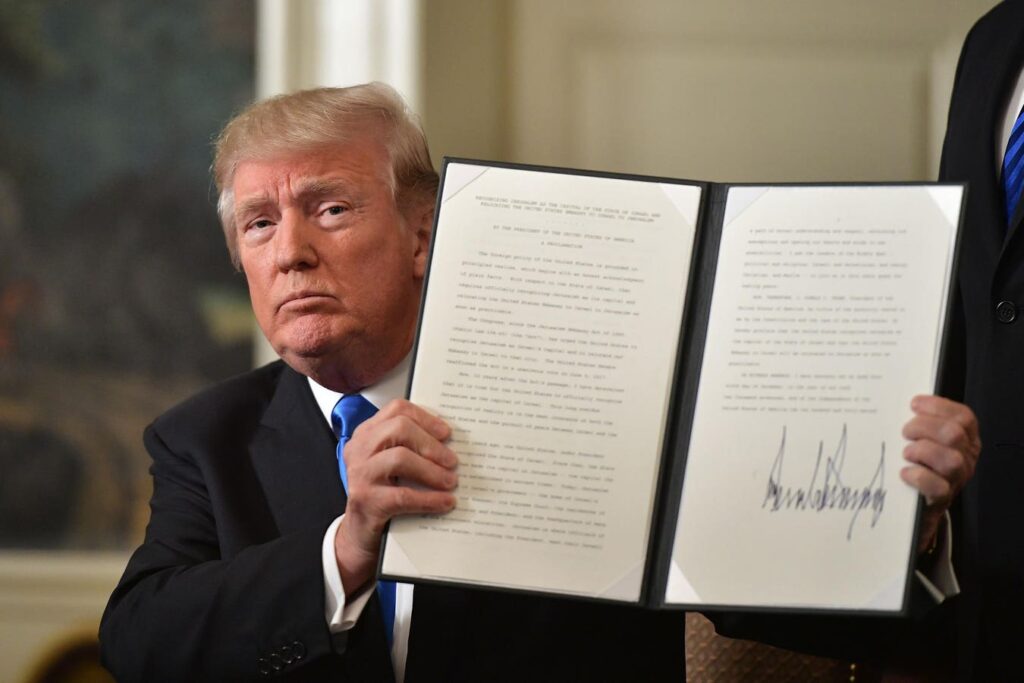US President Donald Trump holds up a signed proclamation. Recently he imposed a travel ban on … More
President Donald J. Trump, citing national security concerns, has reinstated and expanded the controversial nationality-based travel ban first introduced during his initial term. The new ban, formalized in a Presidential Proclamation that came into effect on Monday, June 9, 2025, suspends the entry of nationals from 19 countries, primarily targeting Muslim-majority and African nations.
Scope of the Travel Ban
The proclamation fully suspends immigrant and nonimmigrant visa issuance to nationals of 12 countries: Afghanistan, Myanmar, Chad, Republic of Congo, Equatorial Guinea, Eritrea, Haiti, Iran, Libya, Somalia, Sudan, and Yemen. It imposes partial restrictions on B-1/B-2 tourist visas and F, M, and J student and exchange visas for nationals of Burundi, Cuba, Laos, Sierra Leone, Togo, Turkmenistan, and Venezuela.
Exceptions apply to green card holders, dual nationals, certain special immigrant visa holders, athletes in international competitions, and immediate relatives of U.S. citizens.
The Legal Basis and Court Precedent
The administration relies on a section of the Immigration and Nationality Act, which authorizes the president to suspend the entry of any class of noncitizens deemed “detrimental to the interests of the United States.” That authority was upheld by the U.S. Supreme Court in Trump v. Hawaii (2018), which ruled 5-4 that President Trump’s third version of the travel ban was constitutional, emphasizing executive deference on immigration and national security.
But critics argue that this expanded ban perpetuates discriminatory intent, noting the disproportionate impact on Muslim and African nations and the invocation of Trump’s 2024 campaign pledge to “restore the travel ban and keep radical Islamic terrorists out.”
Discriminatory Impact and Constitutional Doubts
Stephen Yale-Loehr, a professor of immigration law at Cornell Law School, predicts court challenges but warns that they may fail under the current precedent. “Even if this expansion is legal, it is not good policy,” he said. “Families will be separated, and we are not necessarily safer.”
The Council on American-Islamic Relations (CAIR) called the order “ideologically motivated,” “unnecessary,” and “overbroad,” criticizing its chilling effect on lawful travel, academic exchange, and humanitarian reunification.
Legal scholars have started to question the constitutionality of this policy. More specifically, they contend that the Equal Protection Clause of the Fourteenth Amendment prohibits governments from denying equal legal protection, while the Establishment Clause of the First Amendment forbids favouring or disfavoring any religion. Critics argue that Trump’s policy, which targets specific nations commonly associated with certain religions, risks violating both clauses by enabling discrimination based on nationality and faith. Additionally, the Immigration and Nationality Act of 1965 abolished national origin quotas to prevent such bias. By reinstating restrictions linked to religious or national identity, opponents claim the policy mirrors discriminatory practices that the law aimed to eliminate.
Jeremy Robbins, Executive Director of the American Immigration Council, noted: “Blanket nationality bans have never demonstrated any meaningful national security value. This ban hurts our economy and punishes immigrants who qualify to come legally.”
Human and Economic Costs
According to the Canadian Broadcasting Corporation (CBC) “In total, just under 162,000 immigrant visas and temporary work, study, and travel visas were issued in fiscal year 2023 to nationals of the affected countries in the now banned visa categories, according to the Migration Policy Institute.” Nationals from the banned countries represent more than 475 million people globally.
Beyond family separations, the ban may deter students, scientists, and health professionals at a time when the U.S. is experiencing labor shortages in STEM and healthcare. Universities like Harvard have expressed alarm at the targeting of international students, as the administration simultaneously suspended new visas for foreign scholars at select institutions, further stoking fears of ideological purges in academia.
A Return to National-Origin Discrimination?
The 2025 travel ban echoes policies from Trump’s first term and extends their scope. The first “Muslim ban” of 2017 was repeatedly struck down until a more narrowly tailored version survived judicial review. Today’s ban, while more procedurally refined, raises the same fundamental concern: are Americans safer by denying entry based on birthplace? Lyndon B. Johnson’s signing of the 1965 INA famously stated that “the harsh injustice of the national origins quota system” would never return. Critics now argue that President Trump has revived that very shadow, using presidential proclamations instead of legislative quotas. “This is not national security—it’s national scapegoating,” said CAIR Executive Director Nihad Awad. “It undermines constitutional values and stigmatizes entire populations for political gain.”
Conclusion
The legality of the 2025 travel ban reinstated as it is may pass muster under Trump v. Hawaii, but its morality, logic, and long-term consequences remain in question. As lawsuits mount and civil rights groups prepare their defences, the nation must decide: do we protect ourselves by shutting doors or by standing firm in our values of openness, equality, and due process?
Read the full article here
